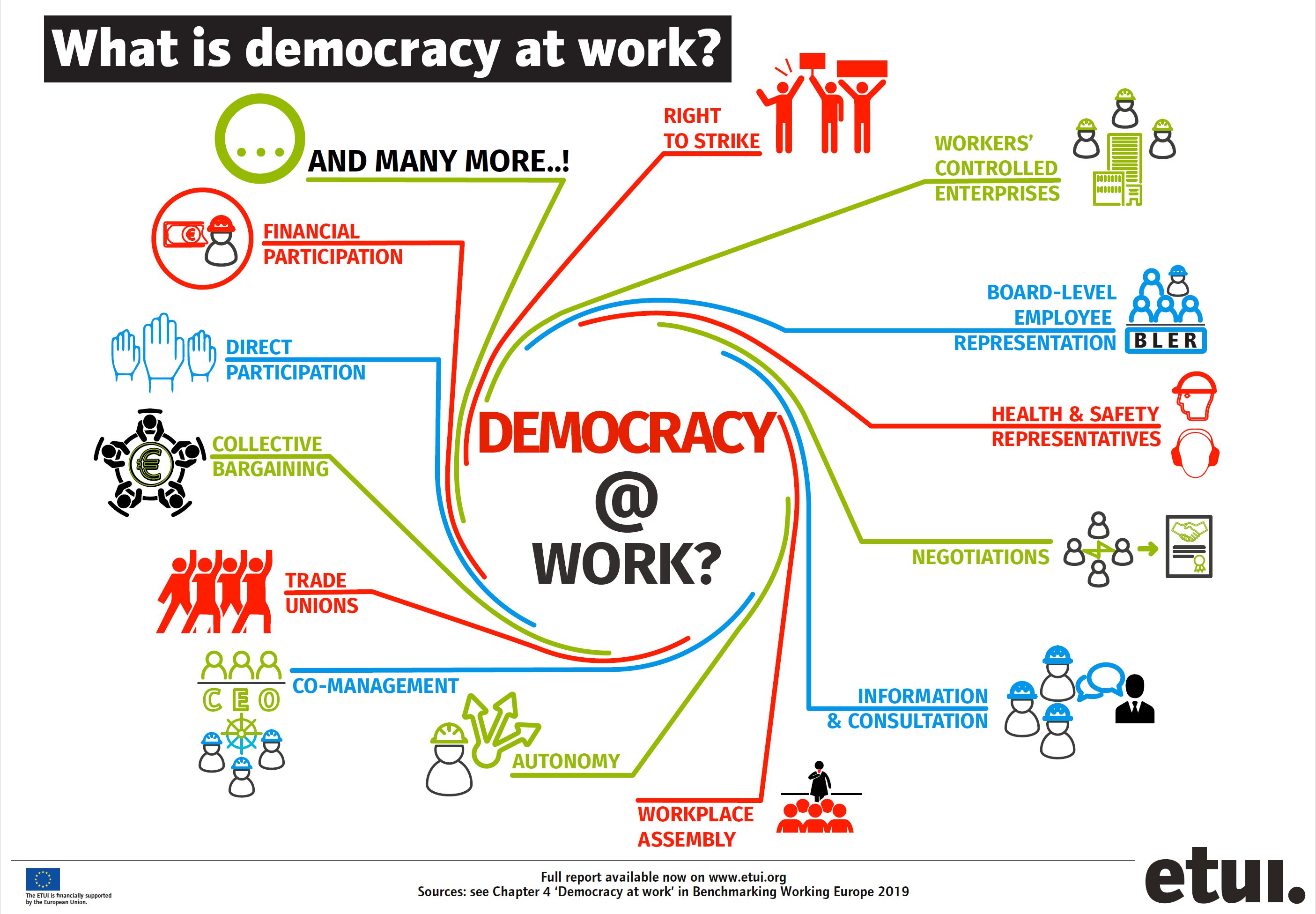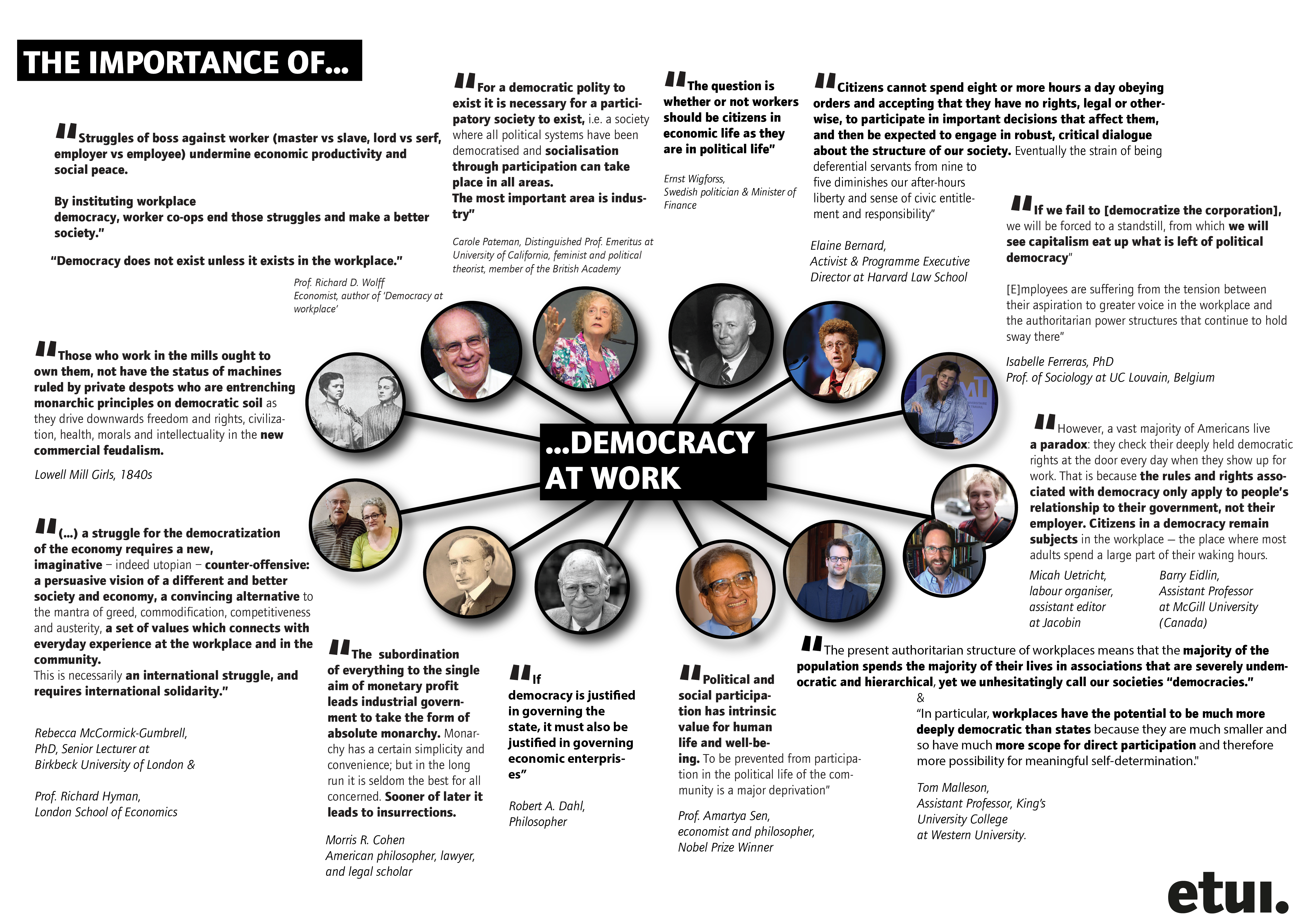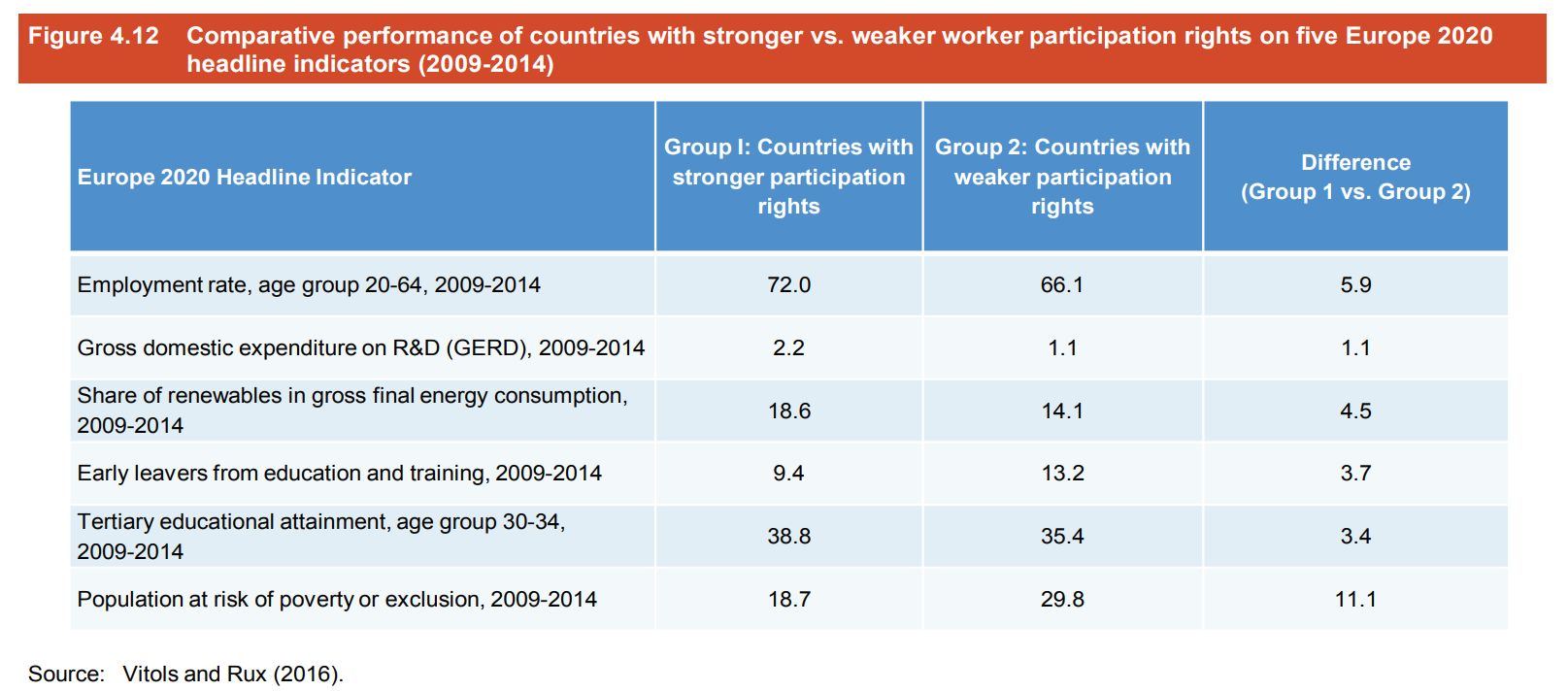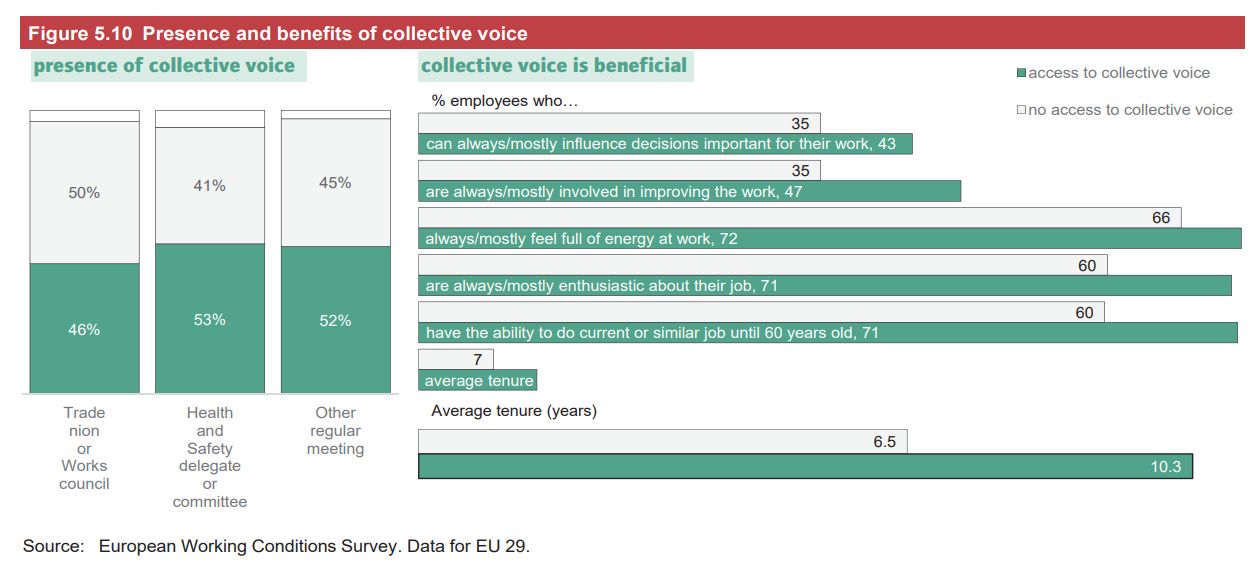There are multiple and wide-ranging reasons why worker participation is an essential part of a modern industrial relations system and the foundation of European Social Model. These concern 1) context; 2) positive impacts and benefits associated with democracy at work; 3) worker participation's non-barrier to smart, sustainable and inclusive growth; and 4) collective voice at work is an asset for all.
1 International context
Since the beginning of the European integration process, there has been a clear commitment to provide employees in Europe with the right to be involved in company decision-making. From the 1970s, this has led to the adoption of a number of European directives supplementing and enhancing national worker participation rights, not least with the recognition of workers’ rights to information and consultation as EU fundamental rights (TFEU), adoption of the European Works Council Directives (94/45/EC and the Recast 2009/38/EC), the European Company (SE) Directive (2001/86/EC) and the Framework Directive (2002/14/EC) on information and consultation, and other legal instruments (e.g. in health and safety).
With more and more companies operating Europe-wide (or even globally) as well as with the ever increasing degree of restructuring affecting companies and their workers the transnational level of employee interest representation is becoming more and more increasingly important. Meeting this challenge requires that company management, employee representatives and their trade unions effectively deal increasingly with cross-border questions of worker participation on different levels. Company decisions are becoming increasingly centralised, leaving little space for autonomous management action at local or national level. Thus:
- European Works Council, European Cooperative Society (SCE) and European Company (SE) information and consultation (I&C) rights provide worker reps with access to first-hand information with the central management; and
- Issues dealt by central management are increasingly transnational in nature – and need matching levels of management and workers’ representation.
2 Positive impacts and benefits associated with democracy at work
Even though some managers still regard employee involvement as an unnecessary burden, workers’ participation is a commonly recognised as an asset to both labour and management:
“accumulating evidence from north-western Europe shows that well-functioning employee representation can play an important role in the modernisation and performance of a workplace.” (EU-Commission 2006: 77)
At the same time, workers’ participation is more than this - it is an expression and embodiment of democracy. Workplace democracy comes in many shapes and colours, as the infographic below indicates.

Indeed, workers' participation is:
- a Fundamental Right in Europe laid down by the Charter of Fundamental Rights of the EU (Article 27);
- an essential part of the European Social Model. At the same time, worker participation strengthens the European Democracy in practice and the economic competitiveness of European companies;
- highlights the fact that a company should not be defined by the sole interest of its shareholders and managers but also by the stakeholders (as a principle of corporate governance);
- means that social interests can be make effective at the level of decision making of a company;
- has to be underlined, thus, by European legislation in order to enforce workers making their interests to the same extend effective as those introduced by the shareholders; and
- European legislation ruling workers' participation rights at transnational level is based on a broad political consensus of the European Parliament and among European Governments.
The ETUI’s recent research on the matter demonstrates numerous positive links of democracy at work to, among others, increased democratic involvement of citizens at large; better health and safety protection of workers; more equality; more sustainability; and higher productivity (see also ETUC and ETUI (2019) Benchmarking Working Europe, Chapter 4 and this graphical online presentation (in Prezi). Furthermore, research on the impacts and inter-linkages of democracy at work and workers’ participation has been an innovative stream of analysis by the ETUI, with the development of the European Participation Index (EPI) since 2010.
On top of the measurable impacts and inter-linkages of democracy at work to other aspects of economy, democracy at large and company performance it also has deep moral and philosophical foundations compellingly expressed by prominent thinkers, politicians, academics and activists.

3 Workers’ participation is not a barrier to smart, sustainable and inclusive growth
The overarching economic strategy of the EU, as stated in the Europe 2020 initiative (European Commission 2010), is the achievement of ‘smart, sustainable and inclusive growth.’ Does workers’ participation hinder or help the EU realise its ambition of being ‘smarter, greener and more inclusive’? An analysis of the evidence since the onset of the crisis suggests that the latter rather than the former is the case. The group of countries with strong participation rights has performed much better than the group of countries with weak participation rights, as measured by key indicators for the Europe 2020 strategy.
This analysis is based on two data sources. The first is Eurostat, which gathers data on the EU’s progress in meeting goals set out in its Europe 2020 strategy in five areas: employment, R&D, cli- mate change and energy sustainability, education, and fighting poverty and social exclusion. In each of these areas the EU has defined statistical indicators which allow countries to measure their progress in meeting specific goals. This data is accessible through a dedicated Eurostat website; a series of publications analyse this data and the progress of each country and the EU as a whole towards achieving these targets (Eurostat 2015). A notable aspect of Europe 2020 is that it goes beyond standard economic measures (e.g. GDP growth) to look at a variety of social and environmental outcomes. However, workers’ participation is not mentioned in the Europe 2020 strategy document, despite evidence from numerous studies that it can have a positive impact.
To take a closer look at this association, researchers at the ETUI developed the European Participation Index (EPI), which measures the strength of workers’ participation at the European level. As reported in detail in the past (ETUI/ ETUC 2011: 98-99), the EPI showed that the group of countries with stronger participation rights performed much better on the Europe 2020 ‘headline’ indicators than the group of countries with weaker participation rights. This was based on data from 2008-09, that is, the onset of the crisis.
An updated analysis based on Eurostat data from 2009-2014 (i.e. since the onset of the crisis) shows that the strength of workers’ participation continues to be strongly associated with positive outcomes on Europe 2020 head- line indicators for all five of the Europe 2020 strategy areas. As shown in Figure 4.12 below, the group of countries with higher than average scores on the EPI per- formed better than the group of countries with below average scores on all of the following indicators: 1) the employment rate in the 20-64 age group, 2) R&D expenditures as a % of GDP, 3) share of renewable energy in total energy consumption, 4) share of early leavers from education and training, 5) tertiary educational attainment for the 30-34 age group, and 6) share of population at risk of poverty or exclusion. The relationship with the strength of worker participation is particularly strong in the case of R&D expenditure, which is twice as high in the ‘strong rights’ group compared with the ‘weaker rights’ group (see also Figure 4.12 showing correlation of the EPI and R&D in individual countries).

The cause of each of these outcomes is of course complex and cannot be reduced to a single factor. However, the strong association between positive outcomes on Europe 2020 indicators and the EPI suggests that worker participation helps rather than hinders the achievement of ‘smart, sustainable and inclusive growth’. As such the strengthening of workers’ participation in Europe could help the EU to reach these ambitious goals.
4 Collective voice: an asset for all
Demanding higher pay, safer workplaces or changes in work organisation is a challenge. Individuals putting forward these demands risk provoking a conflict and recriminations. Even if the individual’s situation is improved, it is not necessarily improved for all. So why should individuals take these risks? If all employees reason the same way, then the employer may have no way of knowing if anything is going wrong, and the organisation (and the employees) might suffer. To this typical problem of collective action there is a simple solution: collective voice. Employees elect representatives who can voice ideas and complaints on behalf of the workforce. Unions, works councils and similar institutions serve to provide such a collective voice, to the benefit of both the employees and the companies.
Freeman and Medoff (1984) described this role of trade unions and works councils and predicted that having such an institution would have beneficial consequences: (1) more employees would be willing to voice their ideas and concerns about what is happening in the company, (2) employees would be more motivated and (3) employees would be more likely to stay in the company.
Using data of the 2015 European Working Conditions Survey of the European Foundation for Living and Working Conditions (Eurofound) in Dublin we can check whether this is correct, and the results look promising. As can be seen in Figure 5.10, employees with access to collective voice are 35% more likely to say they are involved in improvements in their work and 22% more likely to say they can influence decisions in the workplace. So where employees have the opportunity to voice ideas and concerns collectively, they also tend to share them more as individuals. Collective voice and individual voice go hand in hand. Employees with access to collective voice also seem to be more motivated. More than 70% of the employees with access to collective voice say they are mostly or always full of energy at work and feel enthusiastic about their job. For those without access to collective voice this is only 66% and 60% respectively.

Whether or not employees with access to collective voice are less likely to leave the company is more difficult to check using the European Working Conditions Survey. The only two questions related to somebody’s intention to leave is one on whether or not the employees think they could do the same or a similar job until they are 60 years old, and a second question about the length of their tenure in the company. Although these are not perfect indicators, the results also show that 60 years old, and a second question about the length of their tenure in the company. Although these are not perfect indicators, the results also show that employees with access to collective voice are more likely to intend to stay in their current (or a similar) job: 71% compared to 60%. They also have significantly longer tenure than employees without access to collective voice (10.3 years vs. 6.5 years).
As Freeman and Medoff noted, employees can react differently to issues in their jobs, although one reaction (voice) is clearly preferable to the other (exit). Collective voice in the form of a union or a meeting in which representatives of employees can (collectively) voice concerns is beneficial. It is associated with more employees individually voicing ideas for improvement, being more motivated and being less inclined to leave the job. Even when controlling for possible effects of the company size, the country, the employee’s occupation and the sector, the shown relations still stand collective voice in the shape of a trade union, a works council or similar institution is an asset for employees and therefore also for companies.
